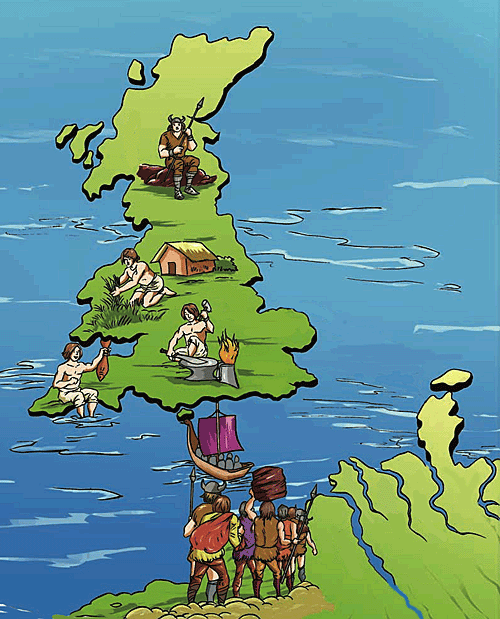English and Its Historical Development, Part 10A
(Anglo-Saxon Heptarchy)
A.D. 731, Teutonic tribes settled in Britain: Saxon, Frisians, Jutes, and Angles eventually forming Englaland (Land of the Angles)

Various Teutonic tribes combined to produce small kingdoms
In time, various tribes combined either for greater strength or under the influence of a powerful leader to produce small kingdoms.
Seven of these were eventually recognized: Northumbria, Mercia, East Anglia, Kent, Essex, Sussex, and Wessex; and are referred to as the Anglo-Saxon Heptarchy.
The groupings were not very permanent, sometimes two or more being united under one king; at other times, kingdoms being divided under separate rulers.
- In about A.D. 477 and A.D. 495, The Saxons and Frisians left Germany for Wessex, Essex, and Sussex (in the south and south-east of England).
- Around A.D. 547, the Jutes settled in Kent; while the Angles went north into East Anglia (south-east England), Mercia (central area of England), and up to Northumbria (northern England).
Dates are approximations according to the Anglo-Saxon Chronicle and Bede in his Ecclesiastical History of the English People (A.D. 731).
The results of these unions can hardly be called a united nation, but West Saxon kings were able to maintain their claim to be kings of all the English, and under Alfred (871-899), Wessex attained a high degree of prosperity and considerable enlightenment.
The language during this time was Germanic
The vocabulary of this period was almost purely Teutonic (Germanic). There were no Latin, French, or loan words from the Greek entering the language during this time.
During the eighth century "seven shadowy kingdoms" emerged from the chaos of embattled Britain. Known as the Anglo-Saxon Heptarchy, they were: Northumbria, Mercia, and East Anglia; which were settled by the Angles. Then there was Kent, settled by the Jutes; and Essex, Sussex, and Wessex, settled by the Saxons.
Although, apparently, each of the Teutonic tribes had its own dialect, whose traces persist today in variations of northern, midland, and southern idioms and inflections; the settlers as a whole were relatively homogeneous in culture and in speech.
In the beginning, their Celtic victims referred to them collectively as Saxons, and Latin writers of the period called them Saxones and their expropriated domain as Saxonia.
Perhaps because of the political and cultural supremacy of the Northumbrian and Mercian settlements in the seventh century, the terms Angli and Anglia became dominant; referring not solely to the Angles in the north, but to all of the immigrant Teutons on the island.
By A.D. 700, the language of Britain was known as Englisc
In A.D. 601, a few years after the arrival of St. Augustine and his forty monks at the Kentish court of King Æthelberht in the first historic mission from Rome, Pope Gregory referred to Æthelberht as Rex Anglorum.
By A.D. 700, the language of the entire land was known as Englisc; the people were called Angelcynn, "kin of the Angles".
It was not until about the year A.D. 1000, however, that the country as a whole became known as Englaland, "land of the Angles". The shift of the initial a in Angle to the e in England is known to linguists as a "front mutation", and is related to the similar shift of Frankish to French, and the evolution of the singular man to the plural men.
The language which the Teutonic invaders bought to their adopted British home completely replaced Latin; except in the Catholic Church, and drove the Celtic tongue forever to the north and west.
Proceed to Part 10B, St. Augustine arrived in Britain with 40 priests.
INDEX or Table of Contents, English and its historical development.
References: sources of information.
